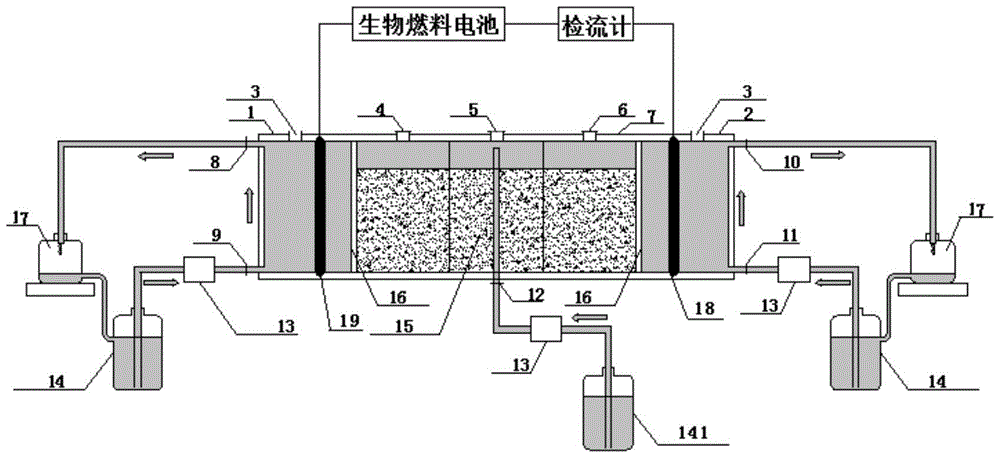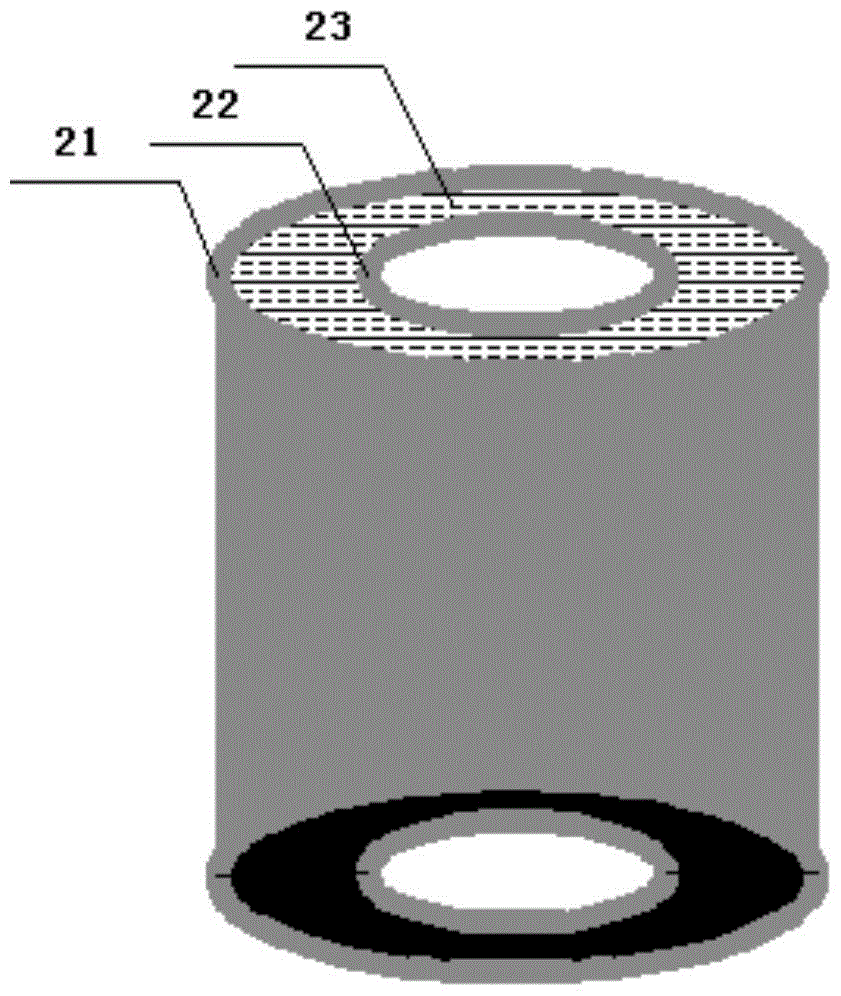A device and method for removing heavy metals and polycyclic aromatic hydrocarbons in river sediment
A technology for polycyclic aromatic hydrocarbons and river sediment, applied in the field of river pollution control, can solve problems such as large engineering volume, secondary pollution, and power consumption, and achieve good control effects
- Summary
- Abstract
- Description
- Claims
- Application Information
AI Technical Summary
Problems solved by technology
Method used
Image
Examples
Embodiment 1
[0052] A device for removing heavy metals and polycyclic aromatic hydrocarbons in river sediment, including an electrolysis device, a biofuel cell and a galvanometer, wherein the electrolysis device includes a cathode area 1, a bottom mud area 7 and an anode area 2, from the left To the right are the cathode area 1, the bottom mud area 7 and the anode area 2; the top of the cathode area 1 and the top of the anode area 2 are provided with a gas outlet 3, and the gas outlet is arranged to facilitate the electrolysis device The internal and external gas exchange ensures the stability of the internal pressure of the electrolysis device, which is conducive to promoting the electrolyte solution to circulate at a stable rate. The upper side of the cathode area 1 communicates with the electrolyte cup through a pipeline, and the electrolyte cup passes through a pipeline. Connected to the inlet of the peristaltic pump 13, the outlet of the peristaltic pump 13 communicates with the lower ...
Embodiment 2
[0077] Aiming at the high content of heavy metals and PAHs pollutants in the bottom mud of a certain river in Anhui, in order to remove the pollutants, a device and method for removing heavy metals and polycyclic aromatic hydrocarbons in the bottom mud of the river are proposed. The device of this embodiment Structure and method thereof are the same as in Example 1, wherein the biosurfactant selects rhamnolipid, and the concentration of rhamnolipid is 250mg / L, and the biosurfactant can also select rhamnolipid and sophorolipid, soap Any one or several combinations of keratin and subtilis; the pH value of the electrolyte solution is controlled to be 6.1, and the flow rate of the electrolyte solution driven by the peristaltic pump 13 is 600mL / h; The generated garbage, that is, vegetable leaves, eggshells, fruit peels and straws are crushed, mixed with wheat bran, rice bran, broken rice husks and bacterial culture material, and mixed evenly according to the mass ratio of 100:3:3:10...
Embodiment 3
[0079] In view of the high content of heavy metals and PAHs pollutants in the sediment of a certain river in Hubei, in order to remove the pollutants, a device and method for removing heavy metals and polycyclic aromatic hydrocarbons in the river sediment are proposed. The device of this embodiment The structure and method thereof are the same as in Example 1, wherein the biosurfactant is selected to use sophorolipids, and the concentration of sophorolipids is 300 mg / L. Biosurfactants can also select sophorolipids, rhamnolipids, and saponins Use in combination with any one or several types of Bacillus subtilis; the pH value of the electrolyte solution is controlled to be 6.5, and the flow rate of the electrolyte solution driven by the peristaltic pump 13 is 700mL / h; Garbage, that is, vegetable leaves, eggshells, fruit peels and straws are broken, mixed with wheat bran, rice bran, broken rice husks and bacterial culture material, and mixed in sequence according to the mass ratio...
PUM
| Property | Measurement | Unit |
|---|---|---|
| particle size (mesh) | aaaaa | aaaaa |
| particle size (mesh) | aaaaa | aaaaa |
| particle size (mesh) | aaaaa | aaaaa |
Abstract
Description
Claims
Application Information
 Login to View More
Login to View More - R&D
- Intellectual Property
- Life Sciences
- Materials
- Tech Scout
- Unparalleled Data Quality
- Higher Quality Content
- 60% Fewer Hallucinations
Browse by: Latest US Patents, China's latest patents, Technical Efficacy Thesaurus, Application Domain, Technology Topic, Popular Technical Reports.
© 2025 PatSnap. All rights reserved.Legal|Privacy policy|Modern Slavery Act Transparency Statement|Sitemap|About US| Contact US: help@patsnap.com


